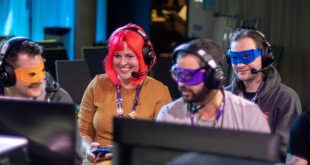

 In this article, Amiqus’ Liz Prince speaks to Limit Break’s Director Lana Zgombić and Programme Co-Ordinator Lauren Kaye about the organisation and its goals.
In this article, Amiqus’ Liz Prince speaks to Limit Break’s Director Lana Zgombić and Programme Co-Ordinator Lauren Kaye about the organisation and its goals.
Tell us about Limit Break.
Lana: Limit Break mentorship was set up specifically to support diverse talent in the UK games industry, to help facilitate connections and support people from under-represented groups in growing and advancing their skills and careers. Our founder, Anisa Sanusi, began the program in 2019 with 100 participants, and this year we have welcomed more than 1,300 mentors and mentees.
Why is mentoring important?
Lana: It has always been recognised that mentorship can play a really valuable role in helping support career growth, and there are many business leaders — from Steve Jobs to Barack Obama — who credit their mentors with a key role in their success. More recently, it has been identified that mentorship can be a great way for companies to help support efforts to increase diverse representation, especially at more senior levels. At Limit Break, we believe mentorship can play a really important role in supporting and encouraging diverse creativity within the video games industry — to help attract and retain people with talent and passion, whatever their background.
Lauren: There aren’t many spaces for newcomers into the games industry to have that valuable 1-2-1 time with employees who are in senior positions. Particularly those who come from lower socioeconomic backgrounds and can’t always be in the places or circles where the games industry gathers. Mentorship gives people a lifeline — someone to speak to who has been down a similar road and can pull back the curtain on practices from around the industry from their own perspective.
Mentorship is also important for the mentor as it forces them to think in new ways and grow their empathy through listening to those who are just joining the industry. It’s a way of not remaining complacent in some of the issues that we’re facing as an industry.
What can mentoring bring in terms of professional and personal development?
Lana: Mentorship offers a great personal and professional development opportunity for both mentors and mentees — which is something we hear often from Limit Break participants. Good mentoring relationships are based on sharing knowledge and experience — whether that involves helping a mentee solve a specific challenge, develop their skills, or work out the next step to take in their career. Becoming a mentor can help people develop their own leadership, coaching and communication skills, as well as providing an opportunity to reflect on their own experience.
As well as being really rewarding, mentorships are a great way to help diversify the groups of people you talk to, see things from fresh perspectives, and spark different ideas.
Lauren: Depending on what type of career you’re currently working towards, mentorship can offer lots of support in various ways. It could be through a portfolio review, development solutions, sharing best practices when it comes to promoting a game, or advice on where to look for more information. From a personal development perspective, mentorship gives you the opportunity to get to know someone. Even if just for that short space of time, you’re making a connection with someone in the same space as you and hopefully in the future can lead to you having someone you could see in a crowd at an industry event.
How can you apply to become a mentor?
Lana: The Limit Break program runs for six months, with applications opening in April each year, and anyone with over five years’ experience in any industry role, regardless of background, is welcome as a mentor. We ask mentors to commit to a six-month mentorship, which usually involves one meeting per month, though mentors and mentees are encouraged to figure out what works best for them. As part of the program, we offer support, resources and training opportunities for all mentors, and every Limit Break mentor also becomes part of our active community — which is a great place to find information, ask questions, and also to build relationships with other people in the industry.
How do you apply to become a mentee?
Lana: Once applications are open, prospective mentees can apply through the Limit Break mentorship platform — where they will be able to find and match with an experienced mentor, based on their goals and areas of interest. All disciplines and experience levels are welcome — from artists and programmers, to marketers and QA specialists. Participation is free and, in addition to regular meetings with their mentor, participants are also able to access a wide variety of resources and support — including access to events, resources and guidance plus membership of the Limit Break community.

 MCV/DEVELOP News, events, research and jobs from the games industry
MCV/DEVELOP News, events, research and jobs from the games industry




